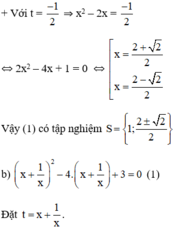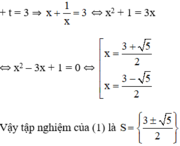Tìm x biết 2x2+3x2+2x+3=0

Những câu hỏi liên quan
1. Tìm x,y:
a) (x+2)2 + (x-3)2 = 2x ( x+ 7)
b) x3- 3x2 + 3x - 126 = 0
c) x2 + y2 - 2x + 4y + 5 = 0
d) 2x2 - 2xy + y2 + 4x + 4 = 0
\(a.\left(x^2+4x+4\right)+\left(x^2-6x+9\right)=2x^2+14x\)
\(x^2+4x+4+x^2-6x+9-2x^2-14x=0\)
\(-18x+13=0\)
\(x=\dfrac{13}{18}\)
Vậy \(S=\left\{\dfrac{13}{18}\right\}\)
\(b.\left(x-1\right)^3-125=0\)
\(\left(x-1\right)^3=125\)
\(x-1=5\)
\(x=6\)
Vậy \(S=\left\{6\right\}\)
\(c.\left(x-1\right)^2+\left(y +2\right)^2=0\)
\(Do\left(x-1\right)^2\ge0\forall x;\left(y+2\right)^2\ge0\forall y\)
\(\Rightarrow\left(x-1\right)^2+\left(y+2\right)^2\ge0\forall x,y\)
Mà \(\left(x-1\right)^2+\left(y+2\right)^2=0\)
\(\Rightarrow\left[{}\begin{matrix}\left(x-1\right)^2=0\\\left(y+2\right)^2=0\end{matrix}\right.\)
\(\Leftrightarrow\left[{}\begin{matrix}x-1=0\\y+2=0\end{matrix}\right.\Leftrightarrow\left[{}\begin{matrix}x=1\\y=-2\end{matrix}\right.\)
Vậy \(S=\left\{1;-2\right\}\)
\(d.x^2-4x+4+x^2-2xy+y^2=0\)
\(\left(x-2\right)^2+\left(x-y\right)^2=0\)
\(\Rightarrow\left[{}\begin{matrix}\left(x-2\right)^2=0\\\left(x-y\right)^2=0\end{matrix}\right.\)
\(\Leftrightarrow\left[{}\begin{matrix}x-2=0\\x-y=0\end{matrix}\right.\Leftrightarrow\left[{}\begin{matrix}x=2\\y=2\end{matrix}\right.\)
Vậy \(S=\left\{2;2\right\}\)
Đúng 0
Bình luận (0)
Bài1: Thực hiện phép tính a) 2x(3x2 – 5x + 3) b) - 2x ( x2 + 5x+3) Bài 4: Tìm x, biết.a/ 3x + 2(5 – x) 0 b/ x(2x – 1)(x + 5) – (2x2 + 1)(x + 4,5) 3,5c/ 3x2 – 3x(x – 2) 36.II. PHÂN TÍCH ĐA THỨC THÀNH NHÂN TỬ Bài1: Phân tích đa thức thành nhân tử.a/ 14x2y – 21xy2 + 28x2y2 b/ x(x + y) – 5x – 5y.c/ 10x(x – y) – 8(y – x). d/ (3x + 1)2 – (x + 1)2e/ 5x2 – 10xy + 5y2 – 20z2. f/ x2 + 7x – 8g/ x3 – x + 3x2y + 3xy2 + y3 – y h/ x2 + 4x + 3.
Đọc tiếp
Bài1: Thực hiện phép tính
a) 2x(3x2 – 5x + 3) b) - 2x ( x2 + 5x+3)
Bài 4: Tìm x, biết.
a/ 3x + 2(5 – x) = 0 b/ x(2x – 1)(x + 5) – (2x2 + 1)(x + 4,5) = 3,5
c/ 3x2 – 3x(x – 2) = 36.
II. PHÂN TÍCH ĐA THỨC THÀNH NHÂN TỬ
Bài1: Phân tích đa thức thành nhân tử.
a/ 14x2y – 21xy2 + 28x2y2 b/ x(x + y) – 5x – 5y.
c/ 10x(x – y) – 8(y – x). d/ (3x + 1)2 – (x + 1)2
e/ 5x2 – 10xy + 5y2 – 20z2. f/ x2 + 7x – 8
g/ x3 – x + 3x2y + 3xy2 + y3 – y h/ x2 + 4x + 3.
Bài 1:
a: \(=6x^3-10x^2+6x\)
b: \(=-2x^3-10x^2-6x\)
Bài 4:
a: =>3x+10-2x=0
=>x=-10
c: =>3x2-3x2+6x=36
=>6x=36
hay x=6
Đúng 0
Bình luận (0)
Bài 1:
\(a,=6x^3-10x^2+6x\\ b,=-2x^3-10x^2-6x\)
Bài 4:
\(a,\Leftrightarrow3x+10-2x=0\Leftrightarrow x=-10\\ b,\Leftrightarrow x\left(2x^2+9x-5\right)-\left(2x^3+9x^2+x+4,5\right)=3,5\\ \Leftrightarrow2x^3+9x^2-5x-2x^3-9x^2-x-4,5=3,5\\ \Leftrightarrow-6x=8\Leftrightarrow x=-\dfrac{4}{3}\\ c,\Leftrightarrow3x^2-3x^2+6x=36\Leftrightarrow x=6\)
Bài 1:
\(a,=7xy\left(2x-3y+4xy\right)\\ b,=x\left(x+y\right)-5\left(x+y\right)=\left(x-5\right)\left(x+y\right)\\ c,=\left(x-y\right)\left(10x+8\right)=2\left(5x+4\right)\left(x-y\right)\\ d,=\left(3x+1-x-1\right)\left(3x+1+x+1\right)\\ =2x\left(4x+2\right)=4x\left(2x+1\right)\\ e,=5\left[\left(x-y\right)^2-4z^2\right]=5\left(x-y-2z\right)\left(x-y+2z\right)\\ f,=x^2+8x-x-8=\left(x+8\right)\left(x-1\right)\\ g,\left(x+y\right)^3-\left(x+y\right)=\left(x+y\right)\left[\left(x+y\right)^2-1\right]\\ =\left(x+y\right)\left(x+y-1\right)\left(x+y+1\right)\\ h,=x^2+3x+x+3=\left(x+3\right)\left(x+1\right)\)
Đúng 1
Bình luận (0)
Tìm x, biết:a) 2(5x-8)-3(4x-5) 4(3x-4) + 11;b)
2
x
(
6
x
-
2
x
2
)
+
3
x
2
(
x
-
4
)
8;c)
2
(
x
3
-
1
)
-
2
x
2
(
x
...
Đọc tiếp
Tìm x, biết:
a) 2(5x-8)-3(4x-5) = 4(3x-4) + 11;
b) 2 x ( 6 x - 2 x 2 ) + 3 x 2 ( x - 4 ) = 8;
c) 2 ( x 3 - 1 ) - 2 x 2 ( x + 2 x 4 ) + ( 4 x 5 + 4 ) x = 6;
d)(2x)2(4x-2)-(x3 -8x2) = 15.
a) x = 2 7 b) x = 2.
c) x = 2 d) x = 1.
Đúng 0
Bình luận (0)
Giải phương trình bằng cách đặt ẩn phụ:
a
)
2
x
2
−
2
x
2
+
3
x
2
−...
Đọc tiếp
Giải phương trình bằng cách đặt ẩn phụ:
a ) 2 x 2 − 2 x 2 + 3 x 2 − 2 x + 1 = 0 b ) x + 1 x 2 − 4 ⋅ x + 1 x + 3 = 0
a) 2 x 2 − 2 x 2 + 3 x 2 − 2 x + 1 = 0 ( 1 )
Đặt x 2 – 2 x = t ,
(1) trở thành : 2 t 2 + 3 t + 1 = 0 ( 2 ) .
Giải (2) :
Có a = 2 ; b = 3 ; c = 1
⇒ a – b + c = 0
⇒ (2) có nghiệm t 1 = - 1 ; t 2 = - c / a = - 1 / 2 .
+ Với t = -1 ⇒ x 2 − 2 x = − 1 ⇔ x 2 − 2 x + 1 = 0 ⇔ ( x − 1 ) 2 = 0 ⇔ x = 1

(1) trở thành: t 2 – 4 t + 3 = 0 ( 2 )
Giải (2):
Có a = 1; b = -4; c = 3
⇒ a + b + c = 0
⇒ (2) có nghiệm t 1 = 1 ; t 2 = c / a = 3 .
+ t = 1 ⇒ x + 1/x = 1 ⇔ x 2 + 1 = x ⇔ x 2 – x + 1 = 0
Có a = 1; b = -1; c = 1 ⇒ Δ = ( - 1 ) 2 – 4 . 1 . 1 = - 3 < 0
Phương trình vô nghiệm.

Đúng 0
Bình luận (0)
1.Tìm nghiệm đa thức
1)6x3 - 2x2
2)|3x + 7| + |2x2 - 2|
2.Chứng minh đa thức ko có nghiệm
1)x2 + 2x + 4
2)3x2 - x + 5
3.Tìm các hệ số a, b, c, d của đa thức f(x) = ax3 + bx2+ cx + d
Biết f(0)=5; f(1)=4; f(2)=31; f(3)=88
Bài 1:
1.
$6x^3-2x^2=0$
$2x^2(3x-1)=0$
$\Rightarrow 2x^2=0$ hoặc $3x-1=0$
$\Rightarrow x=0$ hoặc $x=\frac{1}{3}$
Đây chính là 2 nghiệm của đa thức
2.
$|3x+7|\geq 0$
$|2x^2-2|\geq 0$
Để tổng 2 số bằng $0$ thì: $|3x+7|=|2x^2-2|=0$
$\Rightarrow x=\frac{-7}{3}$ và $x=\pm 1$ (vô lý)
Vậy đa thức vô nghiệm.
Đúng 0
Bình luận (0)
Bài 2:
1. $x^2+2x+4=(x^2+2x+1)+3=(x+1)^2+3$
Do $(x+1)^2\geq 0$ với mọi $x$ nên $x^2+2x+4=(x+1)^2+3\geq 3>0$ với mọi $x$
$\Rightarrow x^2+2x+4\neq 0$ với mọi $x$
Do đó đa thức vô nghiệm
2.
$3x^2-x+5=2x^2+(x^2-x+\frac{1}{4})+\frac{19}{4}$
$=2x^2+(x-\frac{1}{2})^2+\frac{19}{4}\geq 0+0+\frac{19}{4}>0$ với mọi $x$
Vậy đa thức khác 0 với mọi $x$
Do đó đa thức không có nghiệm.
Đúng 0
Bình luận (0)
Bài 3:
$f(0)=a.0^3+b.0^2+c.0+d=d=5$
$f(1)=a+b+c+d=4$
$a+b+c=4-d=-1(*)$
$f(2)=8a+4b+2c+d=31$
$8a+4b+2c=31-d=26$
$4a+2b+c=13(**)$
$f(3)=27a+9b+3c+d=88$
$27a+9b+3c=88-d=83(***)$
Từ $(*); (**); (***)$ suy ra $a=\frac{1}{3}; b=13; c=\frac{-43}{3}$
Vậy.......
Đúng 1
Bình luận (0)
Tìm x biết:
a) 2x2 - 3x - 2 = 0.
b) 3x2 - 7x - 10 = 0.
c) 2x2 - 5x + 3 = 0.
a) 2x2 - 3x - 2 = 0.
<=> (2x + 1)(x - 2) = 0
<=> 2x + 1 = 0 hoặc x - 2 = 0
<=> x = -1/2 hoặc x = 2
Đúng 1
Bình luận (0)
b) 3x2 - 7x - 10 = 0.
<=> (x + 1)(3x - 10) = 0
<=> x = -1 hoặc x = 10/3
Đúng 1
Bình luận (0)
c) 2x2 - 5x + 3 = 0.
<=> (x - 1)(2x - 3) = 0
<=> x = 1 hoặc x = 3/2
Đúng 1
Bình luận (0)
Xem thêm câu trả lời
Bài 13. Cho 2 đa thức: P(x)= 4x2 + x3 - 2x +3 -x-x3 +3x -2x2
Q(x)= 3x2 - 3x +2 -x3 +2x - x2
b)Tìm đa thức R(x) sao cho P(x) - Q(x) - R(x) =0
`P(x)=\(4x^2+x^3-2x+3-x-x^3+3x-2x^2\)
`= (x^3-x^3)+(4x^2-2x^2)+(-2x-x+3x)+3`
`= 2x^2+3`
`Q(x)=`\(3x^2-3x+2-x^3+2x-x^2\)
`= -x^3+(3x^2-x^2)+(-3x+2x)+2`
`= -x^3+2x^2-x+2`
`P(x)-Q(x)-R(x)=0`
`-> P(X)-Q(x)=R(x)`
`-> R(x)=P(x)-Q(x)`
`-> R(x)=(2x^2+3)-(-x^3+2x^2-x+2)`
`-> R(x)=2x^2+3+x^3-2x^2+x-2`
`= x^3+(2x^2-2x^2)+x+(3-2)`
`= x^3+x+1`
`@`\(\text{dn inactive.}\)
Đúng 1
Bình luận (1)
a: P(x)-Q(x)-R(x)=0
=>R(x)=P(x)-Q(x)
=2x^2+3+x^3-2x^2+x-2
=x^3+x+1
Đúng 1
Bình luận (0)
Bài 7: Giải phương trình : a)( x- 2x + 3 ) ( 2x - x+6 ) =18
b) 3x3 + 6x2 –4x = 0
c) 3x2 – 5x = 0
d) – 2x2 + 8 = 0
a: \(\Leftrightarrow\left(-x+3\right)\left(x+6\right)=18\)
\(\Leftrightarrow-x^2-6x+3x+18-18=0\)
\(\Leftrightarrow-x\left(x+3\right)=0\)
=>x=0 hoặc x=-3
b: \(\Leftrightarrow x\left(3x^2+6x-4\right)=0\)
\(\Leftrightarrow\left[{}\begin{matrix}x=0\\3x^2+6x-4=0\end{matrix}\right.\Leftrightarrow\left[{}\begin{matrix}x=0\\x^2+2x-\dfrac{4}{3}=0\end{matrix}\right.\)
\(\Leftrightarrow\left[{}\begin{matrix}x=0\\\left(x+1\right)^2=\dfrac{7}{3}\end{matrix}\right.\Leftrightarrow x\in\left\{0;\dfrac{\sqrt{21}}{3}-1;\dfrac{-\sqrt{21}}{3}-1\right\}\)
c: =>x(3x-5)=0
=>x=0 hoặc x=5/3
d: =>(x-2)(x+2)=0
=>x=2 hoặc x=-2
Đúng 0
Bình luận (0)
Tìm số nguyên x biết:
a) 12-(2x2-3)=7
b) 3x2-12=2x2+4
c) 2x-3.(2x+1)=4x-5.(x-3)
d) (x-2).(x+5)=0
Làm 1 câu bất kì cũng dc ạ!
a, 12 - (2\(x^2\) - 3) = 7
2\(x^2\) - 3 = 12 - 7
2\(x^2\) - 3 = 5
2\(x^2\) = 8
\(x^2\) = 4
\(\left[{}\begin{matrix}x=-2\\x=2\end{matrix}\right.\)
Đúng 0
Bình luận (0)
a) \(12-\left(2x^2-3\right)=7\\ 12-2x^2+3=7\\ 15-2x^2=7\\ 2x^2=15-7=8\\ x^2=8:2=4\\ x=\pm2\)
b) \(3x^2-12=2x^2+4\\ 3x^2-2x^2=12+4\\ x^2=16\\ x=\pm4\)
Đúng 0
Bình luận (0)
b, 3\(x^2\) - 12 = 2\(x^2\) + 4
3\(x^2\) - 2\(x^2\) = 12 + 4
\(x^2\) = 16
\(\left[{}\begin{matrix}x=-4\\x=4\end{matrix}\right.\)
Đúng 0
Bình luận (0)
Xem thêm câu trả lời
Tìm đạo hàm của hàm số
y
2
x
2
+
2
x
+
3
x
2
+
x
+
3
A.
2
−
3
x...
Đọc tiếp
Tìm đạo hàm của hàm số y = 2 x 2 + 2 x + 3 x 2 + x + 3
A. 2 − 3 x 2 + x + 3
B. 6 x + 3 x 2 + x + 3 2
C. 3 x 2 + x + 3 2
D. x + 3 x 2 + x + 3
Đáp án B
y = 2 x 2 + 2 x + 3 x 2 + x + 3 = 2 − 3 x 2 + x + 3 ⇒ y ' = 6 x + 3 x 2 + x + 3 2
Đúng 0
Bình luận (0)























